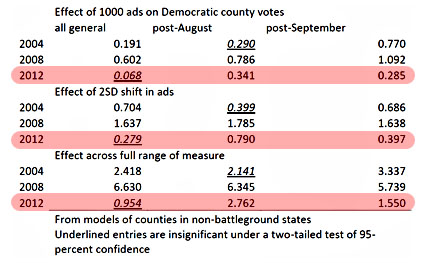Over at the Monkey Cage, Michael Franz has an interesting postmortem on the effect of TV advertising during the 2012 presidential election. He uses a clever design that takes advantage of the fact that ads in battleground states sometimes bleed over the border into non-battleground states,  producing a random set of non-battleground voters who are exposed to large numbers of ads.
producing a random set of non-battleground voters who are exposed to large numbers of ads.
Franz’s bottom line is simple: advertising didn’t have much effect in 2012. The maximum effect—that is, the effect of swapping the market with the biggest Democratic ad advantage to the one with the biggest Republican ad advantage—is about 1 percentage point of the vote share. The effect is bigger if you look solely at ads in the final two months, but not a lot bigger. And this is the biggest possible effect. In more likely scenarios, where one side or the other out-advertised the other by a fairly normal amount, the effect is a few tenths of a percentage point.
This doesn’t mean ads don’t matter. What it means is that (a) they largely cancel each other out, and (b) there’s probably a saturation point above which they have diminishing returns. It’s also likely that ads have less impact in an election featuring a well-known incumbent (ads were apparently more effective in 2008 than in either 2004 or 2012). Nonetheless, this fits with other data suggesting that 2012 was a very fundamentals-driven election. Obama’s superior organization might have made a difference at the margins, but only a small difference. This cake was pretty much fully baked before the Republican Party even agreed on a nominee.
POSTSCRIPT: As clever as this study design is, I do wonder if it’s possible that battleground-state voters respond differently to ads than non-battleground-state voters. Perhaps there’s an interaction between ads and all the other stuff going on in battleground states that makes them more effective than in other places?








